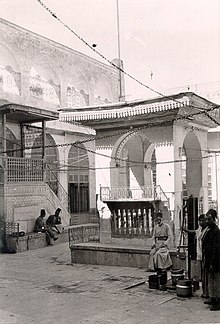Central Synagogue of Aleppo
| Central Synagogue of Aleppo | |
|---|---|
 |
|
| Basic information | |
| Location |
|
| Geographic coordinates | 36° 12' N, 37° 9'E |
| Affiliation | Judaism |
| Rite | Sephardic and Musta'arabi |
| District | Al-Farafira |
| Country | Syria |
| Status | Inactive |
| Architectural description | |
| Architectural style | Byzantine |
| Completed | as early as the 9th century |
The Central Synagogue of Aleppo, (Hebrew: בית הכנסת המרכזי בחאלֶבּ, Arabic: كنيس حلب المركزي), also known as the Great Synagogue of Aleppo, Joab's Synagogue or Al-Bandara Synagogue (Arabic: كنيس البندرة), has been a Jewish place of worship since the 5th century C.E. in Aleppo. When it functioned, it was considered the main synagogue of the Syrian Jewish community. The synagogue is noted as being the location where the Aleppo codex was housed for over five hundred years until it was removed during the 1947 Aleppo pogrom, during which the synagogue was burned. This synagogue still stands.
According to tradition, the foundation for the Great Synagogue in Aleppo was constructed by King David's General, Joab ben Zeruiah, (circa 950 BCE), after his conquest of the city. (See 2 Sam 8:3-8); it is still sometimes referred to as Joab's Synagogue. The oldest surviving inscription is from the year 834 C.E. These early buildings were damaged after the Mongol occupation of Aleppo during the 13th century and then turned into a mosque. During the Mongol period (13th century), the synagogue was one of six designated places of refuge in the city, but was destroyed during Tamerlane's subjugation of Aleppo in 1400. The central synagogue was rebuilt at some point in 1418. In August 1626, the Italian Jesuit Pietro Della Valle, (1586-1682), passed through Aleppo and visited the Great Synagogue of that city, which he described in detail:
...
Wikipedia
